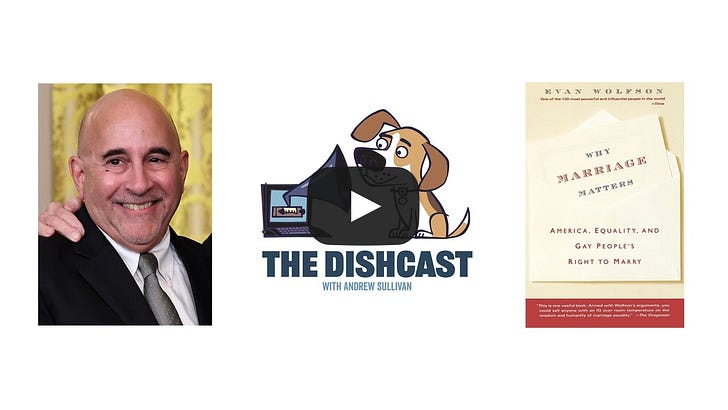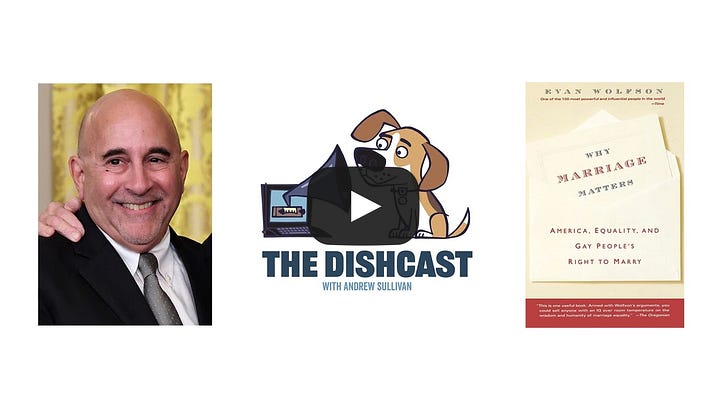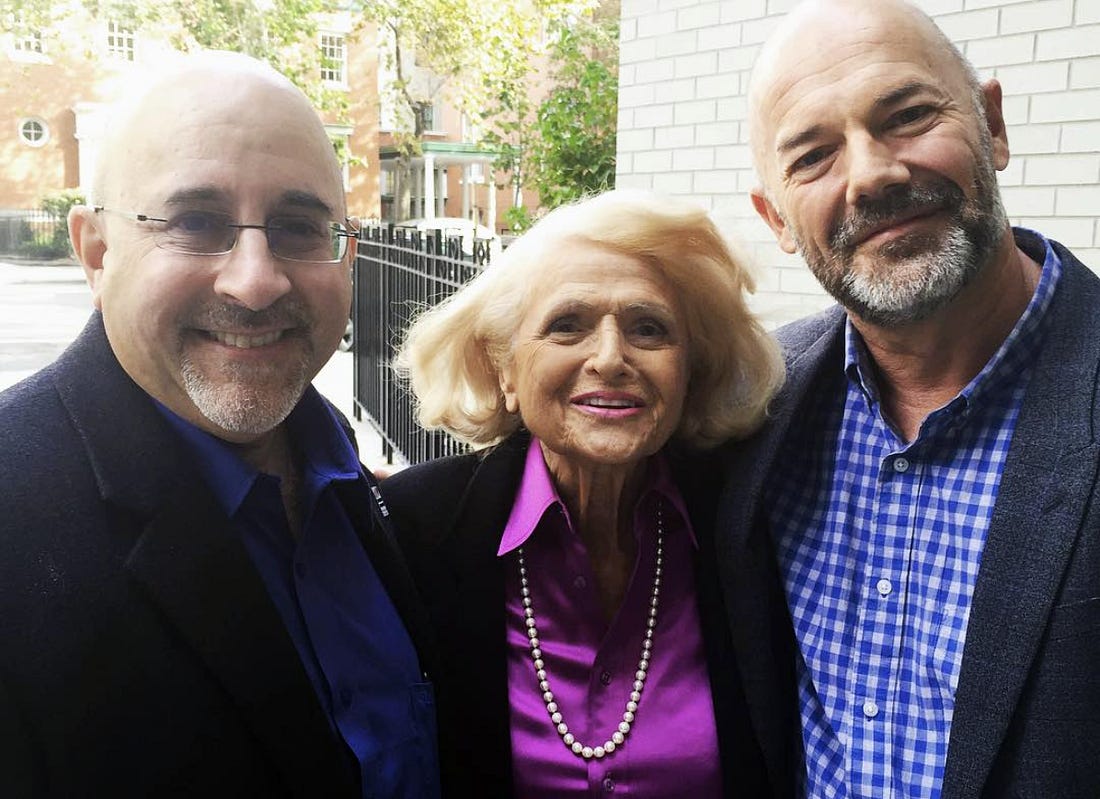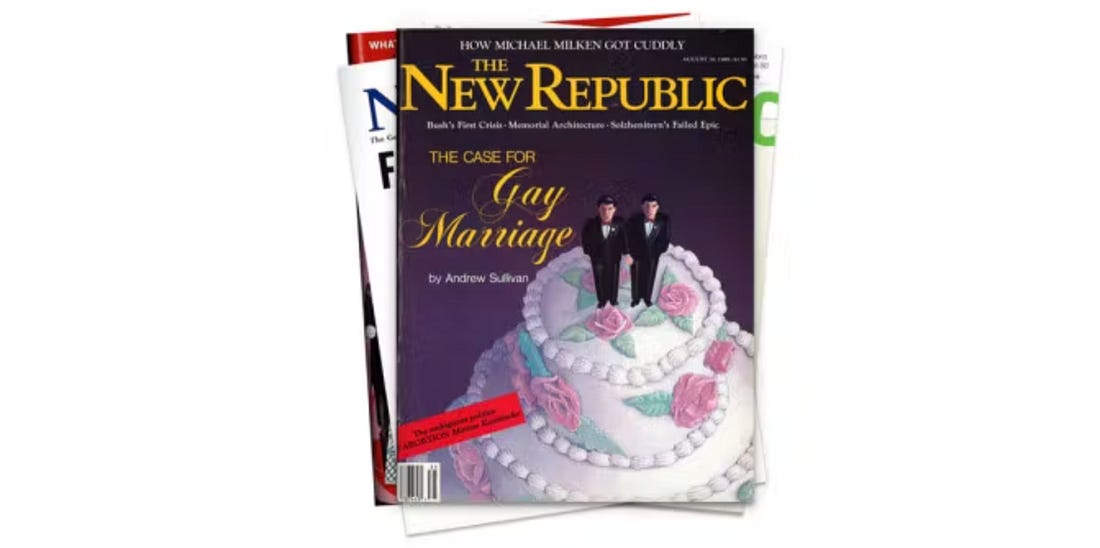Francis is a physician and geneticist whose work has led to the discovery of the cause of cystic fibrosis, among other diseases. In 1993 he was appointed director of the Human Genome Project, which successfully sequenced all three billion letters of our DNA. He went on to serve three presidents as the director of the National Institutes of Health. The author of many books, including The Language of God, his latest is The Road to Wisdom: On Truth, Science, Faith, and Trust.
Our conversation was entirely agreeable until we talked about trust, and his own handling of the Covid epidemic. I asked him in depth about the lab-leak theory and why he and Tony Fauci passionately dismissed it from the get-go, even as it now appears to be the likeliest source of the terrible virus. Things got intense.
For three clips of our convo — debating the “Proximal Origin” paper that outright denied a lab leak as the source of Covid-19; the Occam’s Razor of lab leak; and Francis finding God after decades of atheism — pop over to our YouTube page.
Other topics: growing up on a rustic farm in Shenandoah; his parents creating a community theater; homeschooled until 6th grade; his amazing scientific accomplishments as a young adult; his scientism; his terminally ill Christian patients; the AIDS crisis; C.S. Lewis’ Mere Christianity; the First Mover question; Ross Douthat and “fine-tuning”; the multiverse; the limits to the materialist view; deism; cradle believers vs converts; evolution and sacrificial altruism; Socrates; Jesus dying for our sins; the doubting Thomas; how angels manifest; Francis Bacon; Richard Dawkins; being the NIH director during Covid; trust and mistrust in science; the early confusion in pandemics; tribalism; dismal safety standards at the Wuhan lab; gain-of-function; EcoHealth and Peter Daszak; intel agencies on lab leak; furin cleavage sites; Kristian Andersen; geopolitical fears over Trump and China; the opacity of the CCP; the Great Barrington Declaration; Trump threatening science funding at the Ivies; In Covid’s Wake; and if Francis has any regrets after Covid.
Browse the Dishcast archive for an episode you might enjoy (the first 102 are free in their entirety — subscribe to get everything else). Coming up: Claire Lehmann on the woke right, Stephen Macedo and Frances Lee on Covid’s political fallout, Byron York on Trump 2.0, Robert Merry on President McKinley, Sam Tanenhaus on Bill Buckley, Jake Tapper and Alex Thompson on the Biden years, and Paul Elie on his book The Last Supper: Art, Faith, Sex, and Controversy in the 1980s. Please send any guest recs, dissents, and other comments to dish@andrewsullivan.com.
From a fan of last week’s pod with Evan Wolfson:
Another engaging and informative episode! As a gay man of a certain age (57), I remember Virtually Normal, the good news of Lawrence v. Texas (2003), the heartbreaking setbacks in 2004, the big breakthrough of US v. Windsor (2013), and the final stages of marriage equality ending with Obergefell (2015). I truly enjoyed learning more about the history of the movement pre-2000, so thanks for bringing on the right guest to discuss the topic!

That being said, the best part of the episode was toward the end — on the total intolerance of LGBTQIA+++ activists for any dissenting opinion on gender issues. This week’s Supreme Court decision in the UK allowing for women to retain some distinction based on sex is already causing a social media barrage telling me that either I fully believe that trans men are actual men (and vice versa), or I am a murderous fascist! Fuck that. I will not be told that I cannot engage in any disagreement, no matter how polite and respectful, and ordered to fall into line by the HRC or any other TRAs. They need to grow up, get real, and realize they are losing our hearts and minds by the minute.
Indeed. Separating gay rights from the insane postmodern deconstruction of sex is essential if we are not to surrender to transqueer activists and their demands to destroy single-sex spaces, redefine gay man and lesbians out of existence, and persecute those who dissent. The news in the UK this week is the beginning of a return to sanity. Next up: restoring the sex binary as central to gay and lesbian existence and life.
On another note, I asked Evan if he had suggestions for trans or queer activists who were not entirely on the extreme and prepared to debate me. One was Congresswoman McBride, who seemed like a great idea. My first email invitation to her was March 26; my second was April 9. Here’s hoping she might agree.
On the aforementioned US v. Windsor, here’s a photo of Edie Windsor with Evan and yours truly back in the day:
Another listener writes:
As two accomplished intellectuals, it was not surprising to hear you and Evan Wolfson speak primarily about the effects of the intellectual arguments in ultimately winning the gay marriage fight. I have never been convinced that this was the biggest factor. Most people not only aren’t intellectuals themselves, but they almost never even encounter intellectual arguments in a serious way.
So I think you’re both underestimating how much of the change in opinion on marriage equality was due not to any form of arguments and debate, but simply by enough individual gays being perceived as fun and hip. I would often hear gay men say some version of, “The gays know how to party.” And I recall that when I attended CPAC in 2011, by far the highlight of the evening’s social events among the obviously right-leaning young crowd was the Log Cabin Republicans’ party. It’s hard to oppose any cause when the happiest and most fun person you know says that it’s deeply personal and important to him and central to his identity.
Similarly, I think it’s hard to overstate how much of an effect that shows like Will and Grace had on the gay marriage fight. Instead of being a “gay show,” it was a hilarious sitcom in which two of the characters happened to be gay. It never took itself too seriously and included plenty of naughty gay and lesbian jokes. Some of my gay friends at the time would complain that it did a poor job of representing “gay issues,” but I always emphatically disagreed that some preachy after-school special show about gay rights would have been more effective. Neither I nor almost anyone I know would have an interest in watching such a thing — not because we’re homophobic, but because after a long day, we want to laugh and be entertained, not lectured at.

To the extent that I’m right about that, it seems to me that there’s an important lesson for the trans community today. Rightly or wrongly, many cultural battles are won or lost primarily on vibes — and far too many in the trans community are coming across as moralizing, hysterical, and wildly out of touch. There’s nothing fun about being around someone who is convinced that misgendering is “literal violence,” who is convinced (contrary to all evidence) that we’re in the midst of a trans genocide, and who refuses to accept disagreement with even the most extreme aspects of the political agenda.
While you’re obviously right that the culture matters, and did, I’d still say that placing marriage rights at the center of the gay and lesbian movement was a singular choice, opposed by most of the gay establishment, and was the sine qua non of our success. Seeing gays as fun minstrels for the entertainment of straights was not new in the 1990s or 2000s; it was always our subordinate, assigned role. But saying we are just like you, born into the same families with the same values, was not emphasized by the movement until the 1990s, as Evan and I crafted the message.
The other overwhelming factor, however, was the AIDS epidemic. It revealed gay men not as minstrels or drag queens or queers, but as human beings, wracked with pain, dying so young, pushed to the margins. America rose to that occasion, saw our humanity, and realized we deserved human rights — which is why I retain hope that the current era of rank indecency, promoted at the very top of our society, is not the only truth about America.
Here’s another listener:
You’ve published my emails on the Dish a flattering number of times, especially recently, for which I am immensely honored and grateful. I recently wrote something that was too long to launder through you, so it became my first-ever Substack post — I hope it makes you laugh. It’s worth mentioning that I don’t think I would have had the guts to publish something like this four years ago, even pseudonymously, so thank you “vibe shift.”
On a personal note, I want to thank you for being such a positive influence on my life. I read Virtually Normal as a young gay Catholic back in high school in the ‘90s, and it was one of the first things written by a gay author that I’d ever read. I think it’s to your credit that I’ve spent my life feeling basically normal about being gay.
I’ve been reading the Dish almost almost since it began. Through the years you’ve said the things I didn’t have the courage to say, and you’ve occasionally put my own ideas in front of a larger audience than I could ever hope for. A lot of folks give you the old “I don’t always agree with you, but” — and, sure, I’ve disagreed once or twice — but overwhelmingly, my feeling about you has been gratitude that someone is out there explaining a perspective so similar to my own, so eloquently.
I wish you health and happiness, and may your paid subscriptions be as numerous as the stars of heaven.
How kind of you. Here’s another lovely note:
I had the privilege of working with Evan in the late ‘90s in my position with a small ACLU chapter. We were able to secure notable victories, such as for a lesbian high-school volleyball coach when it became known in her small community that she had left her husband and moved in with her girlfriend; and for a high school Gay-Straight Alliance after the school board banned all extra-curricular clubs rather than face their legal duty of providing a discrimination-free forum as required by the Religious Freedom Restoration Act. (As you frequently note, the woke left too often fails to recognize that freedom of expression is critical to all successful civil rights movements.)
Not based on any special talent of mine, but as a result of my small hand in those victories, I was plucked from obscurity to sit at what was called the “round table” — a regular gathering of leaders from Lambda Legal, GLAAD, NCLR, and other civil-rights organizations to identify and implement the legal efforts for lesbian, gay, and trans rights. Nothing in my 40-year legal career was as challenging and satisfying as working with the likes of Evan, Mary Bonauto, Shannon Minter (whom Evan mentioned in passing) and others in that effort, and I am forever grateful.
I also drew tremendous inspiration from you, Andrew, starting with “Here Comes the Groom,” which I utterly inhaled as a young litigator at a white-shoe firm in NYC. Later, in my civil rights practice, I too grabbed any opportunity to talk to any audience that would have me about marriage equality as perhaps both the most important and self-evident civil rights issue of the time. I also had the immense pleasure and privilege of working with folks from PFLAG (whom you mentioned both directly and indirectly in this and other episodes of the Dishcast). The challenges to our dignity and rights from the state legislature and AG’s office were many, but you and Evan were foremost among those who gave me, and us, the political, social, emotional and legal foundations on which to build.
Legally, today’s young generation literally has no idea what it was like to truly have one’s livelihood and family under attack in the days before marriage equality. During my time at the ACLU, the government attacked not only free speech and employment, but also family formation and even the best interests and basic welfare of children — banning same-sex couples (not individuals, mind you) from being foster parents or adopting kids languishing in state custody. It fell to creative attorneys and dedicated judges to create ad hoc scaffolding to support the families of sexual minorities — and many did so courageously, and to groundbreaking but inevitably fragile and limited effect. You and Evan correctly saw marriage equality as the one solid legal foundation for the stability of all families who desired it.
Emotionally/psychologically, I’m afraid today’s generation also has no idea what it was like to grow up in a world the three of us shared across an ocean and a continent. I heard my own story in both of yours — a distinct awareness of difference without the words or even concepts to express it. I was the “best little boy” you describe, desperately wanting to conform but also fearing I was constitutionally incapable of conforming to the dream of a committed lifetime relationship centered on family and home, seeing nothing in society that provided any model whatsoever for my deepest and only genuine iteration of that dream.
When I moved to NYC in 1987 as a very young man, I could not identify with the club scene or otherwise imagine how I might meet and fall in love with a life partner, so I threw myself into work, becoming something I never really aspired to be: a partner in a major New York law firm. Those choices, and my continued celibacy, may well have literally saved my life, but they still caused a great deal of damage to myself and others. I certainly believed I would never have even a simulacrum of the happiness that was my childhood ideal.
“Here Comes the Groom” was a revelation and a spark, and Evan’s legal work fueled the passion I brought to bear in my civil rights work. I am forever grateful, even as I now transition — with my partner of 20+ years (and husband of 5!) — to retirement and senescence. Let me simply say that I felt that passion and that gratitude anew as I listened to (blush!) two of my idols conversing. So again, to both of you, thank you.
Finally, it would not be an email to the Dish if I did not have a dissent. I’ve noted before your tendency — unfortunate and ironic, given your lifelong and entirely correct insistence that self-determined victims ultimately gain neither sympathy nor power — to lapse into a focus on your own victimization by the far left. In the episode with Evan, you browbeat him into submission on a minor point: your insistence that “not one person, from any organization, ever” would deign to debate you on the wisdom of “gender-affirming care” for minors, or biological men competing with biological women in sports. There are nuances in even such difficult matters, and I’m confident Evan could have surfaced some, had you shown genuine interest in debate, rather than repeating for the umpteenth time your personal grievances (“I was fired!” you bleated at a certain point).
All of that said, I feel your pain (having come under literal death threats when I was at the ACLU) and appreciate your passion. I think your colleague Chris helps you keep your emotions in check in your writing, but in a pod conversation with an even-tempered person like Evan, it provided an unflattering contrast.
I was talking about the profound illiberalism of the leftist queer and trans movements. I didn’t browbeat Evan. I wanted him to acknowledge the extent of his allies’ authoritarianism and failure to move public opinion — because they have effectively inverted the tactics of the successful marriage movement to miserable failure and mounting public opposition. He wouldn’t for obvious reasons. He’d be vilified. In my view, that perpetuates this failure and doesn’t help at all.
This next listener dings Evan on the transqueer stuff:
I thoroughly enjoyed the entirety of your discussion with Evan Wolfson — a figure I deeply admire — but the end section about transqueer orthodoxy was depressing. He sounded, sadly, like a late-stage opponent of marriage equality — avoiding the substance of the issue entirely by falling back on process arguments (we need to have room for debate, there’s “science” on both sides — without evaluating the quality of that science).
When you asked him if there are any Democratic officeholders who questioned the orthodoxy, he could have responded, “Seth Moulton.” For his comments on trans athletes, Moulton was denounced by his local city party and denounced by one activist as a Nazi. Not exactly the healthy debate that Wolfson imagined on the issue.
Thank you. The tribal loyalty is depressing. Not only have the trans and queer movements destroyed the reputation of the gay and lesbian movements by association, they were also central to re-electing Trump.
Their insistence that sex no longer exists, that there are no essential differences between men and women, that gay men can also be biological women, that men should compete with women in sports, and that women should be exposed to naked biological men in their intimate spaces was actually, in one poll, the issue that most moved voters from Democrat to Republican in 2024. The trans and queer movements have not only deeply harmed gay men and lesbians; they have profoundly hurt America and liberal democracy as a whole. They need to be shut down or deeply restored before they do even more harm.
Keeping with the gay stuff, I sparked some debate in Substack Notes this week with the following post I wrote on Grindr’s ban on filtering sex:
Grindr is a deeply unethical company. But it’s also deeply homophobic. You cannot filter out women! Biological women with vaginas must be part of a gay man’s sex life as far as Grindr is concerned. They believe in conversion therapy for gay men the way the religious right does.
Gay men need a new app for men only. The misandry and homophobia have to end.
A reader responded:
Vaginas on Grindr? Don’t let straight men know that. The app will not be able to stem the influx of new accounts. Once again, in the immortal words of Mr Slave from South Park: “But I’m gay; I don’t like vaginas.”
There are actually many straight men looking for trannies on Grindr now. Some are openly homophobic: “NO MEN” is a typical statement on a hookup site for gay men. “WOMEN ONLY” is another one. Of course many of these “straight” men are probably gay but so internally conflicted they can only have sex with a dude if he has breast implants and wears a thong. Nothing wrong with that, of course. But why should an app for gay men be filled with women and straight dudes? Why should so many gay bars now be dominated by straight women?
The goal is to break down any understanding of homosexuality that rests on the sex binary. The attempt to reprogram the entire gay world to become a space for all fluid gender identities, including straights, is, to my mind, homophobic. Why can’t gay men have our own spaces and expect others to respect them? Because the queers and the trans-activists are about the end of homosexuality as same-sex attraction.
Here’s that South Park scene, by the way:

Here’s another SP scene from 2005 (with Matt and Trey, yet again, ahead of the curve):

A reader dissents:
Your claim that Grindr’s gender filter policy is “homophobic” or akin to “conversion therapy” is not only inaccurate, it’s philosophically incoherent. ...










